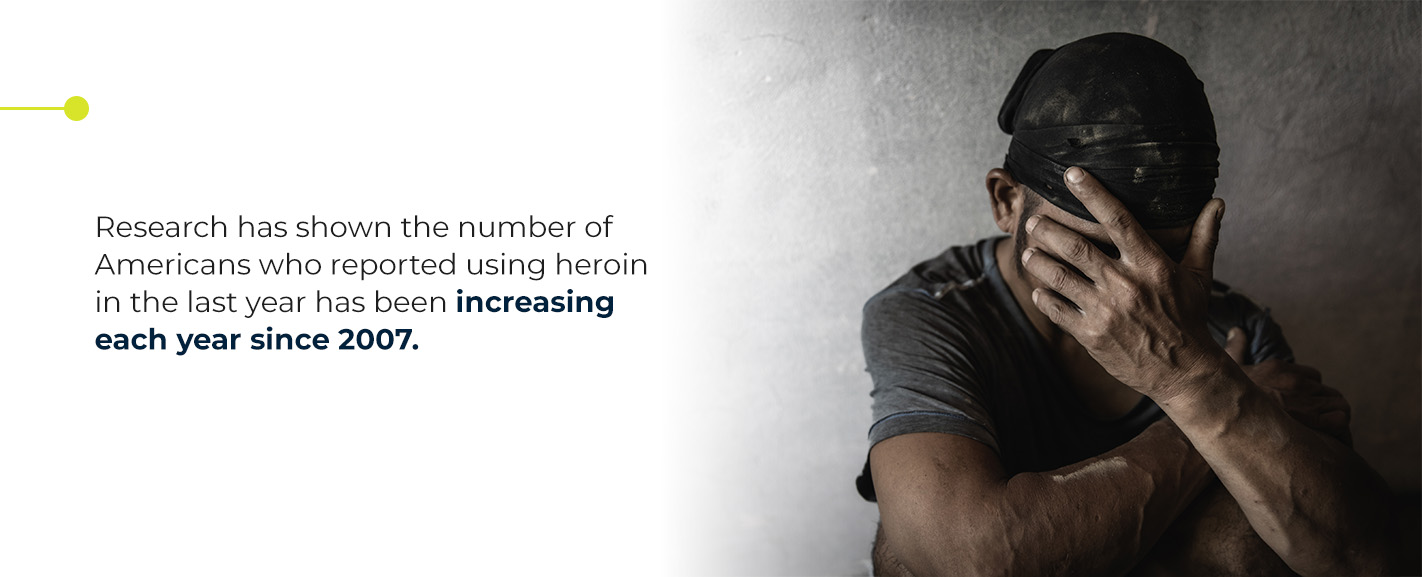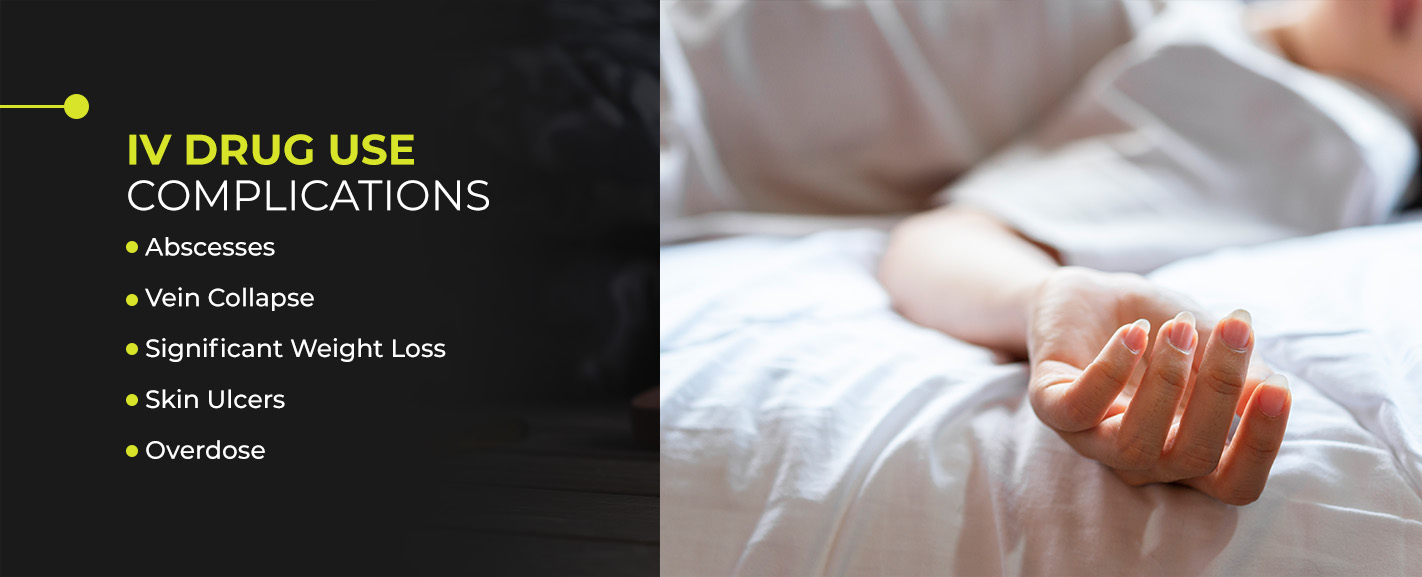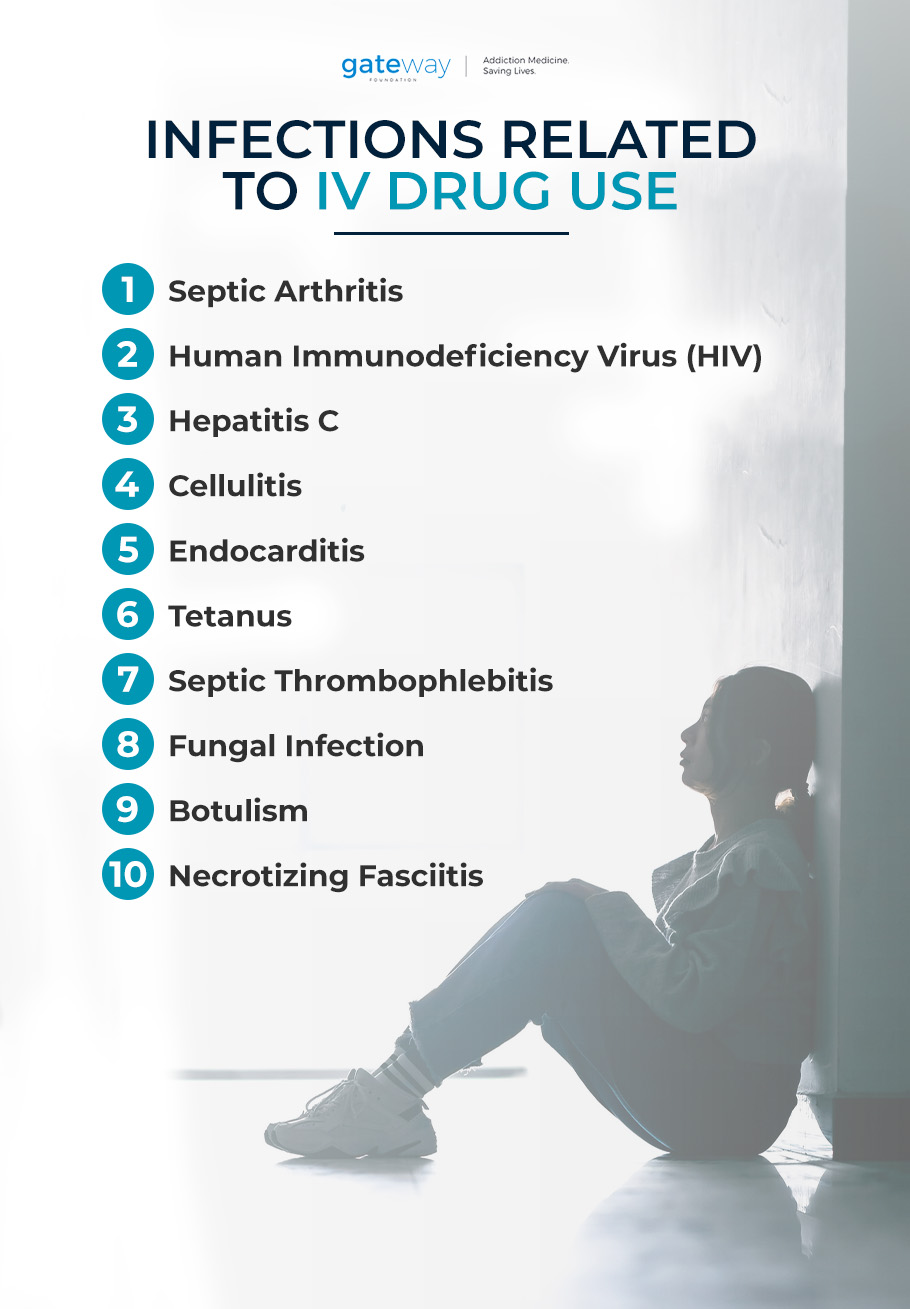- Nov 8
- Drug Addiction Treatment
Intravenous (IV) drug use can cause many adverse effects on health and long-lasting medical complications. When germs are on the skin or the needle, they can be introduced into the bloodstream. That risk factor means IV drug use comes with various health dangers. Learn more about the possible infections and complications associated with IV drug misuse below.
What Is Intravenous Drug Use?
IV drug use involves introducing a drug directly into the bloodstream through a needle. IV drugs are often injected into the veins (intravascular), under the skin (subcutaneous) or the muscle (intramuscular). Apart from marijuana, most drugs can be injected, resulting in stronger and more dangerous effects on the body. The most important aspect of recovering from IV drug use is understanding the severity of your addiction or that of a loved one.
Common Drugs Related to IV Use
There are various drugs that are related to IV use. One of the most widespread and misused IV drugs is heroin. Research has shown the number of Americans who reported using heroin in the last year has been increasing each year since 2007. The most common age group of those using heroin is 18 to 25. In addition to heroin, other common IV drugs include Talwin, fentanyl, buprenorphine and hydrocodone.
IV Drug Use Complications
While misusing any drug is dangerous, IV drug use risks may lead to severe health complications. Misusing IV drugs can cause various skin conditions to form, increase your risk of infection and even result in long-term complications or death. IV drug users often reuse or share needles, which can easily spread various germs and bacteria. When a contaminated needle is injected into the skin, it can introduce bacteria directly into the bloodstream and cause complications such as:
1. Abscesses
Abscesses are a common complication of intravenous drug use, resulting in an uncomfortable collection of pus under the skin. IV drug use can increase the risk of developing an abscess significantly, as well as skin infections and inflammation. For those with an abscess, the skin often feels warm, sensitive and painful to the touch. Understanding the risk factors for skin and soft-tissue abscesses can help prevent the development of drug-related abscesses.
When a virus, bacteria or other germs are introduced and trapped beneath the skin, an abscess can form. Local infection in the skin results in the body’s immune system trying to defend itself from the infection by sending white blood cells to the infected area. The immune system causes swelling to develop, and pus is created from the combination of white blood cells, germs and damaged tissues.
2. Vein Collapse
Continual injections at the same site can cause scarring, bruising and even vein collapse. With continual intravenous injections through the same vein, the vein’s internal lining may become inflamed and collapse. A collapsed vein can no longer function properly, and blood does not travel through this vein anymore.
If left to heal, a collapsed vein may show improvement after the inflammation has gone down. A healed collapsed vein can function normally, with blood flowing through the vein once again. However, if IV drug use is continued in the same injection site, permanent vein collapse can occur. One of the most common symptoms of vein collapse is cold hands or feet due to reduced circulation.
3. Significant Weight Loss
Continual intravenous drug use can cause sudden and significant weight loss. Misusing drugs may provide a false sense of energy, causing the body to need more calories and energy to stay awake for extended periods. One of the most common signs of IV drug misuse is a large amount of weight loss in a few months.
4. Skin Ulcers
Skin ulcers are a common complication that can occur for those who misuse intravenous drugs. A skin ulcer is an open sore that generally occurs due to poor blood flow. Proper circulation is necessary to the body’s ability to heal a wound, such as an injection wound. Without adequate blood flow, the injury is unable to heal properly and can turn into an ulcer.
In most cases, skin ulcers appear as a round open wound or sore on the skin. Sometimes, the border of a skin ulcer may appear thicker or have a raised texture. Skin discoloration around an ulcer is normal, with inflammation and a feeling of warmth developing.
On average, people who inject drugs are over 34 times more likely to develop venous or leg ulcers than those who have never injected before. If left untreated, a skin ulcer will worsen and can begin to pucker or crater. In cases of worsening ulcers, fluid or blood discharge is possible.
5. Overdose
Misusing any medication or drug is dangerous and can result in an overdose. However, one of the most severe health dangers of IV drug use is that it significantly increases the risk of overdosing and death. IV drug use introduces a drug directly to the bloodstream, heightening and intensifying its effects.
A potential overdose needs to be addressed and treated immediately by a medical professional. The severity of a drug overdose will depend on the type and quantity of the drug taken. An overdose can cause serious medical complications and can result in permanent damage or even death in the most severe cases.
Why IV Drug Use Produces Infection
Misusing IV drugs can increase your risk of developing various infections. Bacterial infections from IV drug use may occur when the germs on the skin are pushed into the body when a needle is used. Through a needle, these germs can immediately bypass the normal barriers and protective defenses your skin has, increasing the likelihood that an infection can develop.
If bacteria reach the blood vessels, it can result in a severe vascular infection. In addition to the germs present on the skin, an infection can occur from a contaminated needle that carries bacteria or germs. When a contaminated needle is used, it directly introduces the bacteria into the body and potentially the bloodstream.
Infections Related to IV Drug Use
Misusing IV drugs can negatively affect your health in many ways and increase your risk of developing various infections. IV drug use is especially dangerous as it can expose your body to toxins that cause bloodborne infections. The dangers of IV drug use include an increased risk of infection, permanent damage and raised risk of an overdose.
1. Septic Arthritis
Septic arthritis is a joint infection that typically occurs when an infection travels through the bloodstream to a joint. In addition to the bloodstream, septic arthritis can develop from a penetrating injury that causes germs to enter the joint from a puncture directly. For those who misuse IV drugs, Staphylococcus aureus is the most common infectious agent that results in septic arthritis.
Those who regularly inject drugs are at a higher risk of developing an infection at the injection site. Septic arthritis is a painful infection that can cause extreme discomfort and limit the mobility of the infected joint and surrounding area. Inflammation and fever typically occur when septic arthritis develops.
2. Human Immunodeficiency Virus (HIV)
HIV is a chronic autoimmune disease that can occur from a contaminated needle. IV drug users, especially those who share needles, are at an increased risk of developing HIV. Initially, HIV causes symptoms similar to the flu, including body aches, chills and fever.
Those with HIV may not develop symptoms immediately or assume they may just have a cold or flu. As HIV progresses, it may cause irritated, flakey skin, shingles, oral thrush and significant weight loss. Latency in HIV can last as long as 10 to 15 years, preventing people from receiving a proper medical diagnosis if they are asymptomatic.
3. Hepatitis C
Hepatitis C is a type of viral infection that can be spread through the use of IV drugs. Hepatitis C can be difficult to diagnose early for some patients, as it can take from six months to 10 years or more for symptoms to become apparent. Hepatitis causes inflammation in the liver, which can have serious side effects. On average, approximately 80% of people do not exhibit any symptoms of hepatitis.
The hepatitis virus can cause hepatitis A, hepatitis B and hepatitis C, the most serious of the hepatitis viruses. Hepatitis C can be either acute or chronic, meaning the symptoms are either short- or long-term. While acute hepatitis C symptoms typically occur within a few weeks, chronic hepatitis C symptoms often take several months or even years to develop.
4. Cellulitis
Cellulitis is a common bacterial skin infection that can result in red streaking of the skin, tenderness, inflammation and pain in the infected area. If cellulitis is left untreated, it can cause serious complications and health problems. Many different types of bacteria can cause cellulitis.
While there are many bacteria and even fungi that can cause cellulitis, most cases result from group A Streptococcal bacteria. Cellulitis is one of the most common infections that affect people who use IV drugs. It’s a form of staph infection that can enter the body through vulnerable areas, such as an injection site.
5. Endocarditis
Endocarditis is an infection that develops in the heart’s inner lining or valves. This infection can occur when fungi and bacteria enter the bloodstream. Symptoms of endocarditis may develop quickly for some patients while developing more slowly for others. Untreated endocarditis is a dangerous condition and results in death without proper medical attention.
Endocarditis can damage the heart and cause dangerous medical complications to occur. In severe cases, endocarditis can even be fatal. This infection typically develops when germs or bacteria enter the body and travel through the bloodstream to the heart. Those with damaged or artificial heart valves may be at a higher risk of developing endocarditis.
6. Tetanus
If you have an open wound from an IV injection or IV drug use, bacteria may enter and cause tetanus to develop. Tetanus can cause lockjaw and spasms of the back, neck and chest. Severe tetanus can result in opisthotonos, or arching of the back caused by general muscle spasms.
The spasms associated with tetanus can make it difficult to breathe comfortably and also cause painful muscle contractions. Tetanus can make it difficult to swallow and cause fever and general irritability. To effectively treat tetanus, a physician may suggest antibiotics, muscle relaxers or other therapies.
7. Septic Thrombophlebitis
An infected blood clot causes septic thrombophlebitis in the vein, which can be extremely dangerous and even life-threatening. Common symptoms from septic thrombophlebitis include tenderness and inflammation of the skin overlying the vein. Pus may drain from the infected blood clot, as well.
Antibiotics are often needed to treat septic thrombophlebitis effectively. If you have symptoms of septic thrombophlebitis, you should seek immediate medical attention. An early diagnosis can increase the chance of effective treatment and minimize the potential for possible medical complications.
8. Fungal Infection
Fungal infections are common infections that can develop from IV drug use. The most common fungi that may cause a fungal infection include Aspergillus and Candida. While the symptoms of a fungal infection may vary depending on the type of fungi that caused the infection, common symptoms include a fever and chills.
When fungi are present on the skin or a needle, a fungal infection can develop from IV drug use. In some cases, a fungal infection can spread or even enter the bloodstream, increasing the risk for potential medical complications and side effects. Research has shown that bacterial and fungal infections are increasing among people who inject drugs.
9. Botulism
Those who inject IV drugs are at a higher risk of developing wound botulism, which can be life-threatening. While wound botulism is a less common illness, it is very serious and can develop when a germ known as Clostridium botulinum enters a wound or injection site and creates a toxin. This toxin is dangerous because it attacks the body’s nerves. When the body’s nerves are targeted, it can cause difficulty breathing and general muscle weakness.
Every year in the United States, about 20 people are diagnosed with wound botulism. In more severe cases of botulism, symptoms can worsen and even result in death if left untreated. An antitoxin is needed to stop the negative effects of the toxin in your body to treat wound botulism. In some cases, patients may experience a long recovery even if they receive the antitoxin promptly.
10. Necrotizing Fasciitis
While necrotizing fasciitis is rare, it is a serious and life-threatening complication from intravenous drug use. Necrotizing fasciitis can occur at an injection site and appear as red, irritated or inflamed skin that is often tender and painful. Many people with necrotizing fasciitis may also develop a fever.
Additionally, necrotizing fasciitis may cause a crackling or popping sensation under the skin resulting from gas trapped in the soft tissues. As necrotizing fasciitis develops, it destroys the tissues beneath the skin. Prompt treatment is needed as this condition can develop and spread quickly.
Public Health Problems Related to IV Drug Use
Misusing any drug can cause serious health complications and result in long-term consequences. Injecting a drug is one of the most dangerous forms of drug misuse, as it bypasses your skin’s natural defense systems. IV drug use often causes more intense highs, making it difficult for someone to gauge how much of a drug they have taken.
With stronger and more intense reactions, IV drugs can raise the risk for serious medical complications and overdoses. While overdosing and death are the most serious health problems related to IV drug use, there are numerous short- and long-term health complications. Some of those complications, like HIV, can spread and create public health problems.
Getting the Treatment You Need for Your Addiction
Gateway Foundation takes a holistic approach to substance misuse and drug dependencies. We provide innovative treatments, including withdrawal management, trauma therapy programs and relapse prevention. Our team takes a compassionate approach to treatments and is there to help patients along their sobriety journeys.
We believe in treating each person on a physical, emotional and social level to help them make positive lifelong changes. Professional medical addiction treatments can empower those misusing substances to embark on a journey of recovery and lifelong sobriety. Gateway Foundation is a recognized provider of evidence-based therapies designed to offer patients real results.
Learn more about what we treat and contact us online today or call 877.381.6538 for more information.






